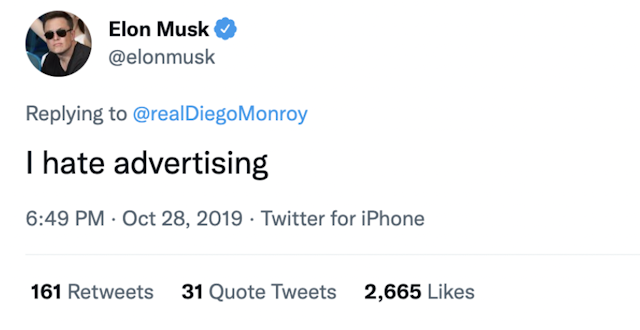It’s 2025. What does Twitter look like?
With priorities including deregulating speech, combating bot traffic and spam accounts, minimizing advertising and fueling the adoption of web3 technologies, Elon Musk's vision for Twitter is bound to disrupt more than just the social media space. Harvey Pitt, head of digital responsibility at humane creative agency Addvert, spells out five predictions for what a Twitter under Musk will look like.

/ Adobe Stock
Well, he's only gone and done it.
Provided there is no further drama, Elon Musk will be the private owner of Twitter in six months' time when the recently accepted purchase offer is finalized. Very little is certain; in fact, the deal itself still could come crashing down. Assuming it doesn't, however, one thing is certain: he will implement radical change at Twitter.
Aside from seeing the first human Tweet on Mars, we’ve outlined five predictions of what these changes will look like in 2025 and what they mean for users and marketers.
Why now?
Elon Musk's business acumen lies in his ability to identify where humanity's vision for progress and creating products to satisfy those demands. Take Tesla, for example. He spotted what the mass adoption of electric vehicles would take and built the product to match.
Musk’s purchase of Twitter is therefore likely driven by his observation that we're all broadly unsatisfied with social media today — and the potential to profit from this reality.
At the same time, Zuckerberg has left social media behind for the ‘metaverse.' As such, Musk has a window of opportunity to fill a gap and potentially face a less aggressive competitor than the one who bought up WhatsApp at a price far above market cap.
At the same time, TikTok has shown that when it comes to the attention economy, everything is still up for grabs.
In essence: the market is ripe for disruption. But Musk has a lot to fix.
Problems plaguing platforms today include inauthentic and spam accounts, misinformation, surveillance-driven advertising (and a corresponding lack of privacy), low-quality and toxic content and a top-down, centralized power structure unsuitable for public forums.
Solving these problems is a big challenge. But any solution will be aptly rewarded with our time and attention. If Musk succeeds in solving these problems, Twitter will be fundamental for all brands' community-building efforts.
A new future for Twitter
What is Musk going to do to solve those problems? Let's fast-forward to 2025 — here are some of the possibilities:
1.“Hello AI!”
There is too much content on social media for humans alone to effectively police. But at the same time, society would never let robots be the sole arbiters of what can and can’t be said online.
But Musk leads teams that make great AI. In Twitter's future, AI will likely be deployed to authenticate the identity of accounts with a human behind them, provide context to tweets that might contain misinformation and remove bot accounts.
This is not to say anonymous accounts will not still exist. It's essential that they do for dissidents organizing under oppressive regimes. However, they may not be able to access all of Twitter's shiny new web3 features.
2. Welcome, web3
Musk knows that cryptocurrencies and NFTs are now firmly part of digital culture. He himself has imbibed in this culture. After tweeting about Dogecoin last year, its value tripled in 24 hours.
It's not just that Musk is buying into the promise of web3, though — making Twitter an accessible place to discuss and participate in web3 culture will allow the company to monetize in new ways without relying on ads (which he's stated expressly that he hates). In a now-deleted tweet he even suggested that Twitter be ad free to untether itself from corporations and their power to dictate platform policy.

Much of web3's current struggle to achieve mass adoption stems from a lack of accessibility. Have you ever tried using Discord (where much conversation surrounding crypto is currently hosted)? It's not exactly user-friendly.
By creating avenues to buy, sell and swap crypto-products, Musk knows that Twitter can have minimal advertising or be totally ad-free. Doing so will also please privacy activists who dislike and avoid social media due to concerns about surveillance capitalism. And that's a lot of people; in fact, per a Cisco survey, about one-third of us are wary of such approaches.
Making Twitter the de-facto channel for consumers who care about privacy will change how brands communicate on the platform. With little access to data, creativity is going to be key to standing out.
3. Embracing individuality
To be successful, Twitter must embrace the different demands each of us have from social media. Casey Newton, the founder and editor of Platformer, a newsletter about democracy and technology, has suggested that Twitter may sell "API access to enable developers to build a variety of different front-end experiences."
This will create a marketplace around the Twitter ecosystem with developers making and selling their own ranking algorithms, user interfaces and plugins (think Typeshare, Revue and Block Party all incorporated in-app). Creating Twitter mini-products, like branded skins for profiles, might become a brand's alternative to running ads on the platform.
4. The return of Trump
Trump will return to Twitter. Musk has made freedom of speech a key narrative throughout his takeover bid.
Of course, actions speak louder than words, and bringing Trump back will show that Musk means business when it comes to free speech. It's a logical inconsistency to deplatform Trump but not the Taliban.
Sure, it'll cause a backlash, but Musk thinks good product features will eventually overcome such controversy. Trump will take his time, too. Rejoining Twitter miay require him to give up on Truth Social. But he loves the reach Twitter that gives him too much not to return.
5. Day of reckoning
Social media is a poisoned chalice. It is incredibly challenging to make decisions that everyone on the political spectrum will agree with. The direction in which Musk takes Twitter will define how he is characterized.
If Musk is able to create a platform where we can come together, he'll be lauded as social media's savior. If users and brands dislike the changes he makes, he'll be painted as a villain. In this case, expect to see Musk rapidly distance himself from the platform to save his other companies.
At Addvert, we believe that social platforms for the people should be owned by the people. In general, web3 is taking online platforms in this direction, as are newcomer platforms like WeAre8. We hope Musk continues the trend with the changes he makes at Twitter.
So there you have it. The Twitter of 2025 will be full of NFTs. AI will be adding context to false claims and booting off bot accounts. Trump will be back and opinions on Elon Musk will likely polarize, as they do for everyone that sips from the poisoned chalice that is social media. But these are just the predictions of one small digital agency. Musk himself probably doesn’t even know what he’s going to do. You’ll probably have to rethink how your brand reaches its audience on Twitter, though.
Harvey Pitt is head of digital responsibility at Addvert.
